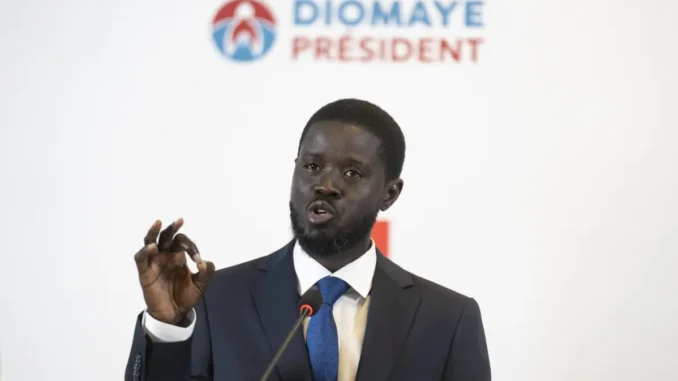

Senegalese politics were rocked on Tuesday when Ousmane Sonko, the fiery leader of the opposition, was named prime minister by newly elected President Bassirou Diomaye Faye. This historic deal on power-sharing signifies a dramatic change in Senegal’s political climate. As a political novice who has promised to bring in a period of reform following a period of national instability, analysts are characterizing Faye’s move as a risky bet. Sonko has long been a thorn in the side of the establishment since he is a charismatic and frequently contentious character. His nomination to the position of prime minister shows that Faye is prepared to work across party lines and listen to the grievances of people who were marginalized under the previous administration.
A Political Shooting Star, Faye: Faye, at forty-four, is the youngest president of Senegal in history. He became well-known as a left-wing pan-Africanist head of the Taxes and Estates Union. There, he promoted tax reform, saying Senegalese citizens should have a more equitable and open tax system. He also put a lot of emphasis on homeownership since he thought that having a house was essential to both social stability and economic empowerment. After a moment of national unrest, his political career took off. Ten days after being released from prison, Faye’s party won the presidential election by overwhelming margins. There is a newfound sense of hope in the nation as a result of his unexpected win and dedication to overturning the current system. Senegalese see him often.
face with the capacity to bring about significant change. Faye’s inexperience in public service is cause for both optimism and worry. His supporters think that because he is an outsider, he will be able to take on the powerful forces that they feel have been holding Senegal behind. Critics, however, are concerned that he does not have the political background necessary to handle the many issues the nation faces.
A Political Shooting Star, Faye: Faye, at forty-four, is the youngest president of Senegal in history. He became well-known as a left-wing pan-Africanist head of the Taxes and Estates Union. There, he promoted tax reform, saying Senegalese citizens should have a more equitable and open tax system. He also put a lot of emphasis on homeownership since he thought that having a house was essential to both social stability and economic empowerment. After a moment of national unrest, his political career took off. Ten days after being released from prison, Faye’s party won the presidential election by overwhelming margins. There is a newfound sense of hope in the nation as a result of his unexpected win and dedication to overturning the current system.
He is viewed by many Senegalese as a newcomer with the ability to bring about significant change. Faye’s inexperience in public service is cause for both optimism and worry. His supporters think that because he is an outsider, he will be able to take on the powerful forces that they feel have been holding Senegal behind. Critics, however, are concerned that he does not have the political background necessary to handle the many issues the nation faces.
Potential and Uncertainties: Political observers are agog about this historic decision. Some consider it a daring attempt to heal long-standing tensions and promote national unity. Some doubt the ability of leaders of different philosophies to collaborate successfully. The capacity of both parties to heal these divisions and carry on reform pledges will determine the viability of this unusual collaboration.
There may be advantages and disadvantages to take into account. On the one hand, the divergent opinions of Faye and Sonko can cause stalemate and stagnation. However, their disparate points of view could also result in a more thoughtful and nuanced approach to policymaking. In the end, the success of this collaboration will depend on Faye and Sonko’s capacity to come to an understanding and create a vision for Senegal’s future.
Global Repercussions: Other West African countries may be impacted by Senegal’s political transformation. The democratic method of settling political disputes in the nation may serve as a template for other countries in the area.

Be the first to comment